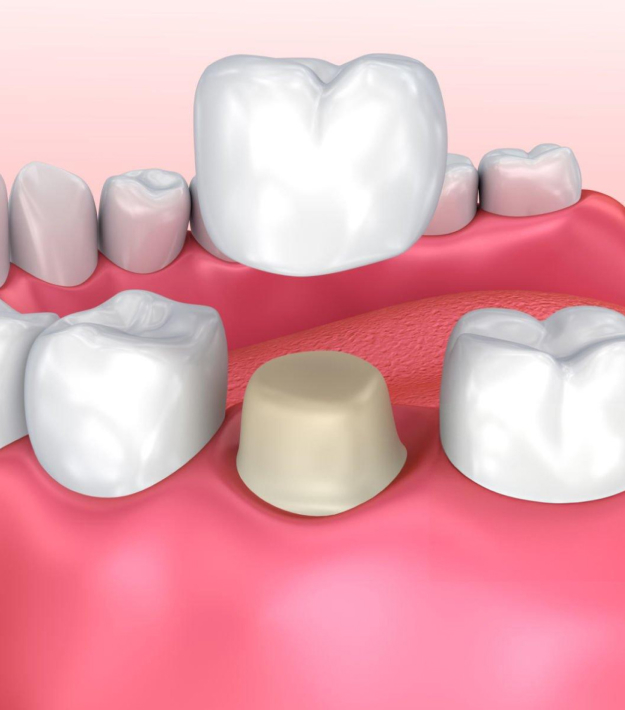8092 Edwin Raynor Blvd # D, Pasadena, MD 21122

Say Farewell to Chips and Cracks: Achieve a Flawless Smile with Dental Crowns
Restore your confidence and oral health with premium dental crowns at Pasadena Dental Group. Dental crowns, also called dental caps, are versatile restorative solutions crafted to cover damaged, decayed, or aesthetically compromised teeth. Located in Pasadena, MD, our practice excels in creating custom dental crowns that seamlessly blend with your natural teeth, restoring both function and appearance.
Led by our dedicated dental team offers personalized care tailored to your needs. Whether safeguarding a weak tooth, covering a dental implant, or enhancing your smile's aesthetics, we provide a variety of crown materials such as porcelain, ceramic, and metal alloys to suit your preferences and budget.
With our unwavering commitment to excellence and patient-centered care, each crown is meticulously designed for durability and aesthetics. Explore how dental crowns can rejuvenate your smile and promote optimal dental health.
When Do You Need Dental Crowns?
- Restoration of Severely Decayed Teeth: Crowns protect and cover teeth with extensive decay that cannot be restored with fillings alone.
- Fractured or Cracked Teeth: Crowns provide stability and support for teeth that are fractured or cracked due to trauma or wear.
- Protection After Root Canal Therapy: Teeth weakened by root canal treatment benefit from crowns to prevent further damage.
- Support for Large Fillings: Crowns strengthen teeth with large fillings, preventing them from dislodging.
- Cosmetic Enhancement: Crowns improve the appearance of misshapen or severely discolored teeth, enhancing smile aesthetics.
- Anchorage for Dental Bridges: Crowns anchor dental bridges, replacing missing teeth and restoring function.
- Covering Dental Implants: Crowns placed over dental implants provide natural-looking replacements for missing teeth.
What Are The Different Types of Dental Crowns?
- Porcelain Crowns: Highly aesthetic and color-matched to blend seamlessly with your natural teeth.
- Porcelain-Fused-to-Metal (PFM) Crowns: Combine the strength of metal with the natural appearance of porcelain, offering durability and aesthetics.
- Metal Crowns (Gold or Other Alloys): Known for their strength and longevity, suitable for posterior teeth.
- All-Ceramic Crowns: Made entirely of ceramic material, providing excellent aesthetics and biocompatibility.
- Composite Resin Crowns: Cost-effective and color-matched to natural teeth, although may not be as durable as other types.
What Happens When You Get A Crown?
- Expert Preparation: Our dentist in Pasadena, MD begins by expertly preparing the tooth, removing any decayed or damaged parts, and reshaping it precisely to ensure a perfect fit for the crown.
- Precision Impressions: Detailed impressions of the prepared tooth are taken using advanced technology to guarantee an accurate fit for your custom crown.
- Temporary Protection: While your permanent crown is meticulously crafted in our dental laboratory, a temporary crown is placed to safeguard your tooth and maintain functionality.
- Seamless Placement: Once your custom crown is ready, it is carefully bonded onto the prepared tooth using high-quality dental cement for a durable and secure fit.
- Customized Comfort: Our dentists meticulously check the fit and bite of your crown, making precise adjustments as needed to ensure optimal comfort and functionality.
How To Care For Your Dental Crowns?
- Daily Oral Hygiene: Brush your teeth at least twice a day and floss daily to prevent plaque buildup around the crown.
- Avoid Hard Foods: Refrain from chewing hard foods like ice or nuts that could damage the crown.
- Use a Mouthguard: If you grind or clench your teeth, wear a custom mouthguard to protect both your natural teeth and the crown.
- Regular Dental Visits: Schedule regular dental check-ups and cleanings to ensure the crown remains in good condition and your overall oral health is monitored.
- Avoid Sticky or Chewy Foods: Minimize consumption of sticky or chewy foods that could dislodge the crown.
- Immediate Attention: If you experience sensitivity, pain, or notice the crown feeling loose, contact your dentist promptly for evaluation and necessary adjustments.
Frequently Asked Questions (FAQs)
New Patients & Emergency
Appointments Welcome!
New Patients & Emergency
Appointments Welcome!
